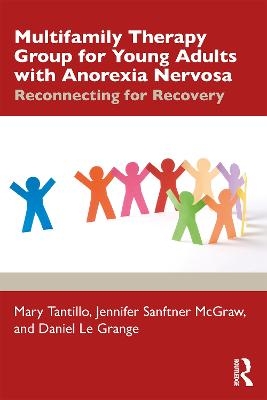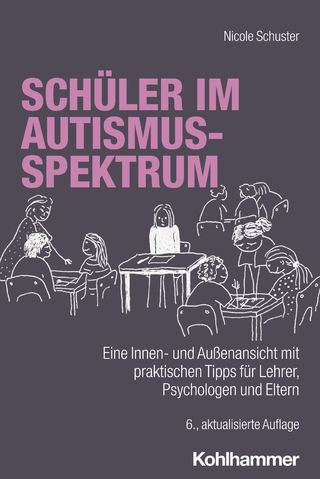
Multifamily Therapy Group for Young Adults with Anorexia Nervosa
Routledge (Verlag)
978-1-138-62490-0 (ISBN)
Developed in concert with young adults and their families and informed by clinical observations, theory, and research, R4R is designed to help young adults and family members learn the emotional and relational skills required to avoid or repair relationship ruptures for continued collaboration in recovery. The book begins with an overview of anorexia nervosa, MFTG treatment approaches, and the development of R4R and moves into a session by session review of R4R including session goals, exercises and handouts. Protocols, case vignettes, and other materials help translate the theory and research underlying this multifamily therapy group model into practice.
This treatment manual provides readers with explicit guidance in how to develop and conduct an outpatient R4R MFTG and a deeper understanding of the nature, purposes, and processes that characterize one.
Mary Tantillo, PhD, PMHCNS-BC, CGP, FAED, is professor of clinical nursing at University of Rochester School of Nursing, director of the Western New York Comprehensive Care Center for Eating Disorders, and founder of The Healing Connection Inc. Jennifer Sanftner McGraw, PhD, is professor of psychology and department chair at Slippery Rock University and founder and director of the Slippery Rock chapter of the Reflections Body Image Program. Daniel Le Grange, PhD, holds a distinguished professorship in the department of psychiatry at the University of California, San Francisco and is director of the eating disorders program in the Division of Child and Adolescent Psychiatry. Santo Caruana, Artist and young adult in recovery from an eating disorder. Marie Bieber RD, CSP, CDN, Registered dietitian specializing in eating disorders in private practice and on the Western New York Comprehensive Care Center for Eating Disorders Project ECHO TM team.
Chapter 1: Reconnecting for Recovery (R4R): A Relational/Motivational Multifamily Therapy Group for Young Adults with Anorexia Nervosa; Chapter 2: The Promise of Multifamily Therapy Group for Young Adults with Anorexia Nervosa; Chapter 3: Development of the Reconnecting for Recovery (R4R) MFTG approach and this Manual; Chapter 4: Getting Ready: Group Structure, Co-Facilitation, Recruitment, and Initial Phone Screening; Chapter 5: Session 1: Engaging and Evaluating Young Adults with Anorexia Nervosa and Their Families: Assessment, Joining and Orientation; Chapter 6: Session 2: Engaging and Evaluating Young Adults with Anorexia Nervosa and Their Families: Assessment, Joining and Orientation (continued);Chapter 7: Session 3: Anorexia Nervosa: A Disease of Disconnection - Introduction, recovery process, motivational interviewing principles, and the spiral of change; Chapter 8: Session 4: Anorexia Nervosa: A Disease of Disconnection - Introduction, recovery process, motivational interviewing principles, and the spiral of change (continued); Chapter 9: Session 5: Biopsychosocial Factors for Anorexia Nervosa & Co-morbidity; Chapter 10: Session 6: Biopsychosocial Factors (continued), Disconnection and Functional Analysis Skills; Chapter 11: Session 7: Strategies to Promote Mutual Connection; Chapter 12: Session 8: Anorexia Nervosa and the Family Context: Rules and Relationships; Chapter 13: Session 9: Identifying Points of Tension and Disconnections Related to Anorexia Nervosa, Recovery and Relationships; Chapter 14: Session 10: Nourishing and Empowering the "We" in Relationships; Chapter 15: Session 11: Waging Good Conflict in Connection; Chapter 16: Session 12: Moving from Disconnection to Connection: Building Strong Connections to Work through Tension and Disconnections Related to Adulthood and Recovery; Chapter 17: Session 13: Relapse Prevention and Maintaining Good Connection; Chapter 18: Session 14: Relapse Prevention (Continued) and Preparing for Termination; Chapter 19: Session 15: Relapse Prevention (Continued), Termination, and Next Steps for Continued Connections in Recovery; Chapter 20: Session 16: Relapse Prevention (Continued), Termination, and Next Steps for Continued Connections in Recovery; Chapter 21: What is Next? Training, Dissemination, Clinical Practice and Research
| Erscheinungsdatum | 15.01.2020 |
|---|---|
| Zusatzinfo | 19 Tables, black and white; 7 Line drawings, black and white; 17 Halftones, black and white; 24 Illustrations, black and white |
| Verlagsort | London |
| Sprache | englisch |
| Maße | 152 x 229 mm |
| Gewicht | 453 g |
| Themenwelt | Geisteswissenschaften ► Psychologie ► Familien- / Systemische Therapie |
| Medizin / Pharmazie ► Medizinische Fachgebiete ► Psychosomatik | |
| Medizin / Pharmazie ► Medizinische Fachgebiete ► Psychiatrie / Psychotherapie | |
| Sozialwissenschaften ► Pädagogik ► Sozialpädagogik | |
| Sozialwissenschaften ► Soziologie | |
| ISBN-10 | 1-138-62490-X / 113862490X |
| ISBN-13 | 978-1-138-62490-0 / 9781138624900 |
| Zustand | Neuware |
| Haben Sie eine Frage zum Produkt? |
aus dem Bereich


